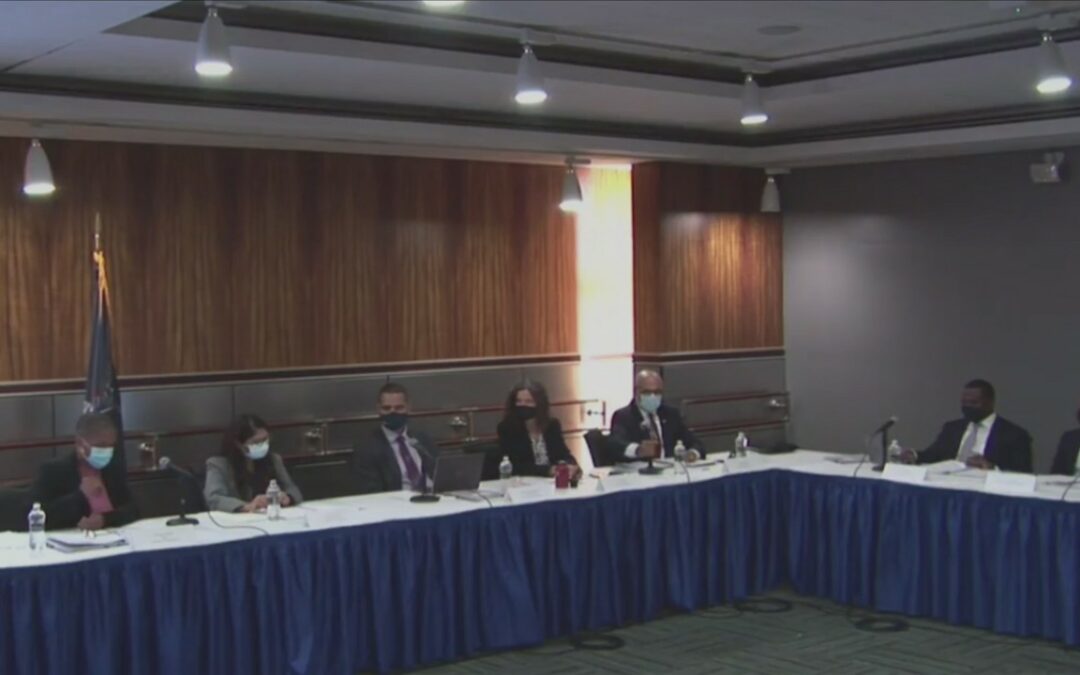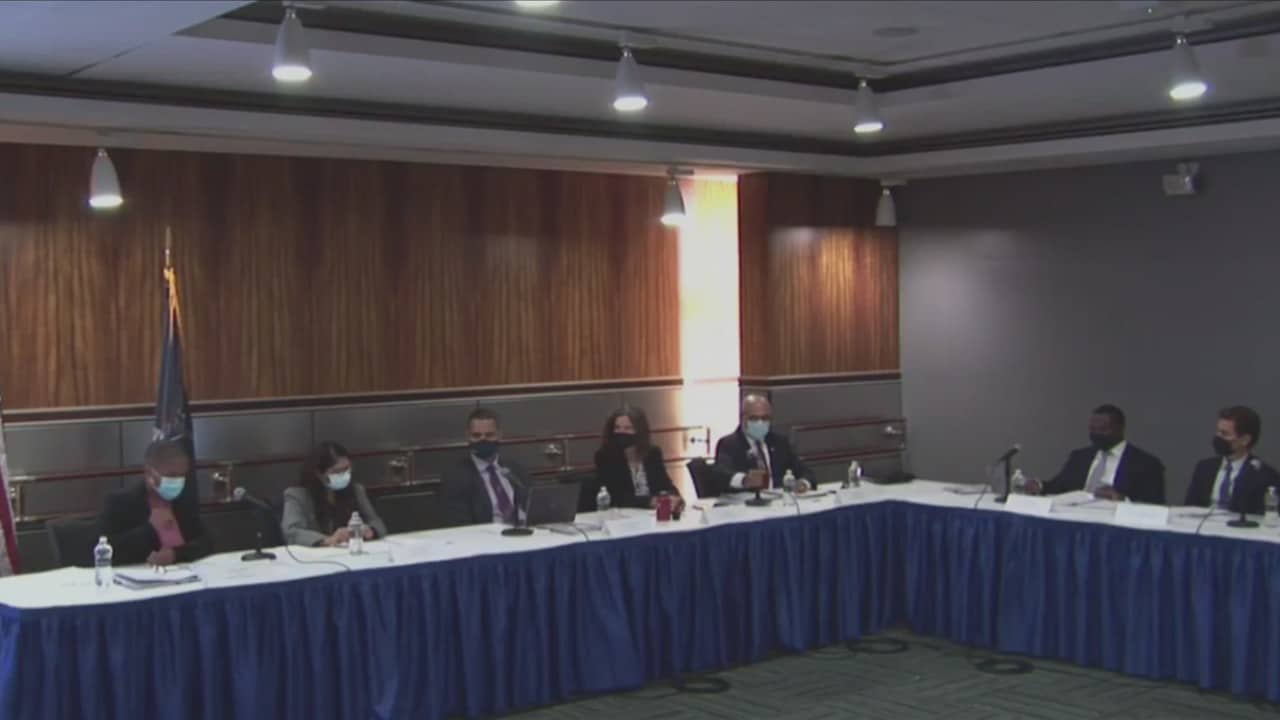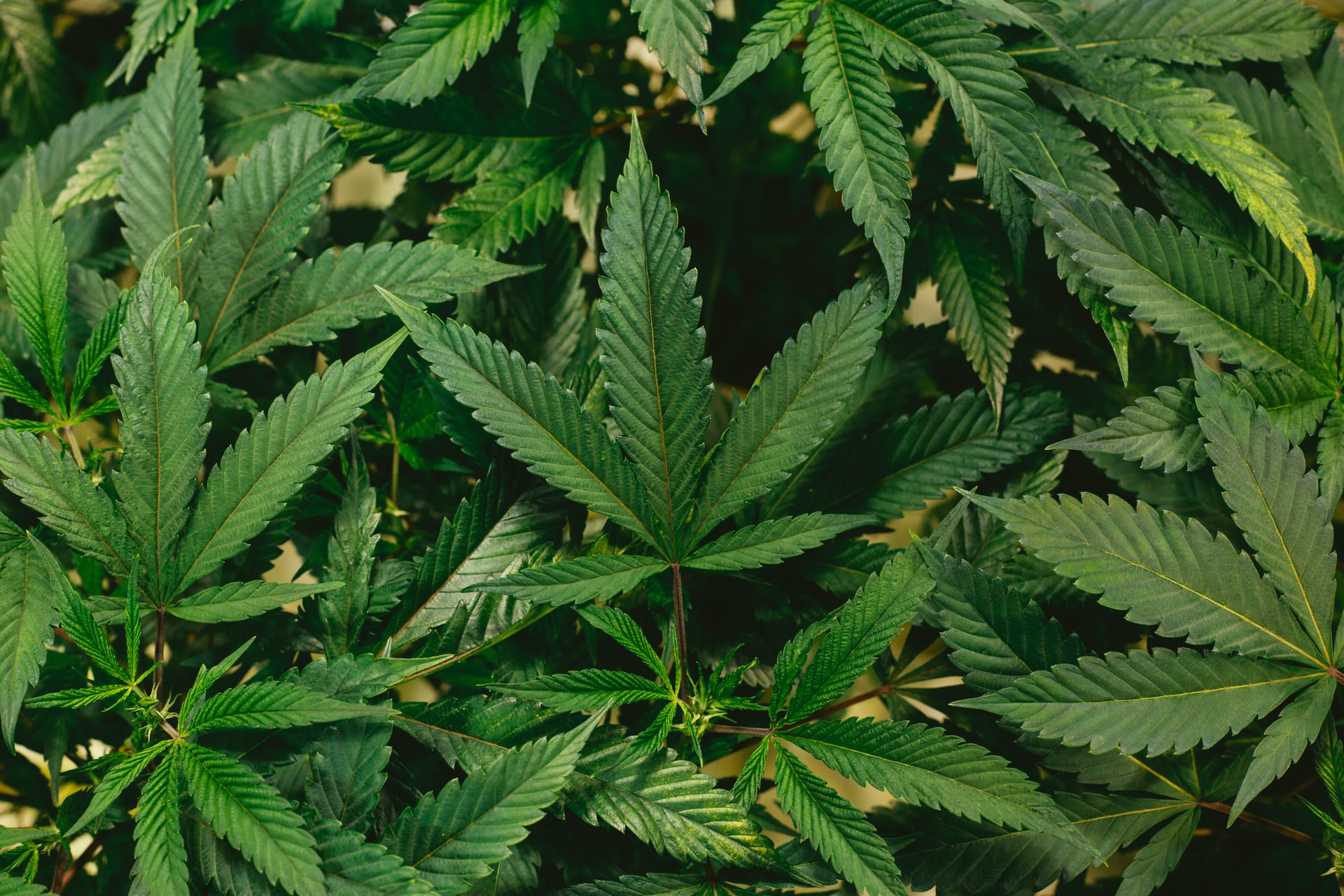
by The Real Dirt | Oct 7, 2021 | 420 News, Blog, Business, Cannabis Business, Cannabis Law, Cannabis Law and Compliance, Cannabis News, Industry News, Legalization, Politics
New York marijuana regulators on Tuesday sought to make up for delays in the drug’s rollout by approving a chief equity officer and making immediate changes to the medical cannabis program during the inaugural meeting of the state Cannabis Control Board.
The five-member board charged with implementing marijuana legalization and advancing the state’s cannabis industry set a clear tone: They wanted to move past delays in implementing the Marijuana Regulation and Taxation Act.
The state law legalizing marijuana took effect in March, but infighting between then-Gov. Andrew Cuomo and the state Legislature exacerbated delays in getting members appointed to the board, slowing down the work of getting regulations for legal sales in place.
“The MRTA was signed into law on March 31. But we were not able to begin the work of establishing New York’s cannabis market until Sept. 22, when the full cannabis control board was appointed. As such, there was a six-month delay to make up,” Christopher Alexander, executive director of the Office of Cannabis Management, told the board Tuesday afternoon.
The state legislature ended its regular session without making appointments to the board because lawmakers had been entangled in a fight with Cuomo over appointments to the Metropolitan Transportation Authority.
Since Cuomo left office in August, Gov. Kathy Hochul has made getting the board going central to her early administration, saying in a statement announcing several new members of the board: “New York’s cannabis industry has stalled for far too long.”
The impact of the slow rollout could be felt. A portion of the law that would allow marijuana cardholders to grow plants six months after the law went into effect was delayed because the board was not in place, the Times Union in Albany reported.
But on Tuesday, the regulators moved ahead with several changes to the medical cannabis program. They include permanently waiving a $50 registration fee for patients and caregivers and making the whole flower an approved form of medical cannabis product.
Another provision allows for a 60-day supply of medical cannabis to be given to a certified patient or designated caregiver instead of a month supply.

by The Real Dirt | Sep 30, 2021 | Blog, Cannabis Business, Cannabis Law, Cannabis Law and Compliance, Industry News, Legalization, Politics
The news this week that a small Massachusetts town is charging more than $1.3 million in “impact fees” to the three cannabis companies operating within its city limits has reopened the debate over the true impact of cannabis businesses on local communities.
In a recently filed
lawsuit, the cannabis retailer
Stem revealed that the city of Haverhill, Massachusetts, is charging its three cannabis businesses a total of $1.3 million in annual impact fees—and $866,930 of that total is earmarked for the town’s police department.
Those impact fees are being charged despite the fact that myths about cannabis businesses boosting crime have been debunked time and time again. In fact, there’s evidence that cannabis legalization can actually improve local crime clearance rates.
Even as they operate as positive law-abiding forces in their communities, cannabis companies still have to combat the negative stereotypes perpetuated by America’s War on Drugs.
Without any evidence of negative community impact, we’re left to wonder why some towns and cities are allowed to charge cannabis businesses for additional policing.
Cannabiz impact in Massachusetts
Massachusetts’ legalization law allows local communities to charge impact fees that are “reasonably related to the costs imposed upon the municipality by the operation of the marijuana establishment.”
Unlike most other legal states, Massachusetts law forces cannabis companies to sign Host Community Agreements (HCAs) with the town in which they operate. This gives local communities enormous leverage over cannabis companies—which encourages them to tax the daylights out of the local weed stores.
Many Bay State towns use HCAs to create their own mitigation fees based on how they imagine cannabis businesses will impact their townships.
The law was put in place in 2018, when there was little data about the impact of cannabis companies on rates of local substance abuse, intoxicated driving, and crime.

by Travis C | Sep 28, 2021 | Blog, Business, Cannabis Business, Cannabis Law, Cannabis Law and Compliance, Cannabis News, Industry News, Legalization, Politics

Nearly a year after passing a constitutional amendment to legalize cannabis, New Jersey has yet to open a single retail cannabis store. While the industry has yet to take off, that isn’t stopping regulators from preemptively banning one of the most popular cannabis products.
When it comes to the cannabis products that consumers want, flower remains king. Vaporizer pens and concentrates for dabbing have been slowly catching up with flower as consumers seek a quicker way to get the desired effects of cannabis without burning the plant itself.
However, cannabis edibles have also been gaining popularity. Avoiding the need for any sort of inhalation at all, edibles are great for consumers who don’t want to vape or smoke, but still want the effects of cannabis.
Cannabis beverages have seen the greatest growth since the beginning of 2020, when cannabis sales skyrocketed across the country due to the COVID-19 pandemic. Cannabis capsule products have also grown noticeably in popularity, showing that consumers are seeking a way to consume cannabis without, well, consuming traditional cannabis.
With such growth in the edible cannabis market, it would seem obvious to any potential industry that is about to open that edibles will be a high-demand product. Higher demand means higher profits, which is what any state is seeking when legalizing cannabis.
Unless you’re New Jersey.
Ban on almost all cannabis edibles
Despite having no functional legal cannabis industry to base their decision, regulators in charge of New Jersey’s recreational cannabis have decided to ban all forms of edible cannabis products except for lozenges. This means traditional products consumers would likely be familiar with — cookies, brownies, gummies, beverages — are all prohibited.
The reasoning behind the ban is the same used by many states when they first legalize; the children. Concern over edible products that might appeal to children is a consistent issue in the legal cannabis industry.
While other states passed new regulations requiring child-proof packaging and prohibiting edibles from being designed in a manner that would be appealing to kids (i.e. gummy bears, star-shaped cookies, etc.), New Jersey has decided to take a much more restrictive approach.
According to the new set of regulations passed by New Jersey cannabis regulators, “ingestible forms of cannabis… shall only include syrups, pills, tablets, capsules, and chewable forms.”
A growing and thriving grey market
Just because regulators are dragging their feet in getting a functional legal cannabis industry up and running doesn’t mean that the people aren’t already taking advantage of the new law. Seemingly taking a tip from the Washington D.C. playbook, New Jersey has begun to develop a thriving grey market industry.
While there is nowhere to legally buy or sell cannabis directly, there’s a workaround. Similar to how D.C.’s grey market operates, New Jersey currently has a gift/donation system in place to skirt the current regulations.
In this grey market, a consumer may find a delivery service online. One the website one might see several different cannabis products, or “packages” as they might be called. However that isn’t technically what the consumer is buying.
Instead, the cannabis product is simply a “gift” that is included with the purchase of another item on the website. This might be a sweatshirt, a t-shirt, or even something as small as a sticker. The price of the sticker may be around $40, which conveniently is the same price as an eighth of cannabis.
Within a couple hours, a delivery driver will be at the door with the sticker and the included gift, and bam you just “bought” legal cannabis in New Jersey. But just like D.C.’s grey market, the grey market in New Jersey is completely unregulated.
Although a legal cannabis company has to follow strict regulations on manufacturing and packaging, an unregulated market like that which is blooming in New Jersey has no such restrictions. So while regulators may think they are making progress by banning various forms of edible cannabis products, these new rules will be all but ignored by those operating in the grey market already.
In other words, the new regulations can’t possibly have any sort of impact until there is an actual legal industry to enforce them. As regulators take their time getting the legal cannabis industry up and operational in New Jersey, the grey market will continue to thrive only making it more complicated to get legitimate businesses licensed and running.
If you are interested in learning more about the New Jersey cannabis industry, need assistance with licensing, planning and implementation of your business plan, Greener Consulting Group can help you stay on top of the latest regulatory changes, fees and best practices for getting ahead of the competition when the industry takes off.

by The Real Dirt | Sep 24, 2021 | 420 Culture & Travel, 420 News, Blog, Cannabis News, Culture, Industry News, Legalization
Cannabis is coming to the California State Fair.
For the first time, the fair in 2022 will host a competition — open to all licensed cannabis cultivators in the state — to judge the finest flower in California.
Entrants will be divided into three divisions: indoor, mixed light and outdoor. Judges will evaluate the cannabis flower, with seven individual cannabis plant compounds being tested and identified for awards. That includes two cannabinoids — CBD and THC— and five terpenes, which are naturally occurring aromatic compounds that give the plant its characteristic smell and which are a source of plant essential oils and resins.
The California State Fair will hand out 77 bronze, silver, gold and double gold medals to the winners, as well as seven Golden Bear trophies for the “Best of California” in each category.
“We are pleased to celebrate California’s legal and licensed cannabis industry as part of the California State Fair in 2022,” said Jess Durfee, chairman of the California Exposition and State Fair Board of Directors, in a statement. “For the past 166 years, the California State Fair has always been a first mover, leading the state fair circuit with innovative programming and large-scale competitions that celebrate the best the state has to offer, making the addition of cannabis cultivation a natural new category.”

by The Real Dirt | Sep 23, 2021 | 420 News, Blog, Business, Cannabis Business, Cannabis Law, Cannabis Law and Compliance, Cannabis News, Industry News, Legalization, Politics
The U.S. House of Representatives late Tuesday night approved a bill that would let banks to do business with cannabis companies without fear of penalty, giving traction to the least-disputed reform sought by the growing industry.
The so-called SAFE Banking Act would be a boon for marijuana companies, which have so-far been stymied by the necessity to deal in cash because of federal restrictions. That has meant they have extra security costs and logistical problems, even as marijuana increasingly becomes legal. Some three dozen states now allow medical or recreational use, according to New Frontier Data, a cannabis research firm.
The measure, which has been passed by the House before with bipartisan support, was this time approved by voice vote as part of the National Defense Authorization Act.
Representative Ed Perlmutter, a Colorado Democrat, who had re-introduced the bill, has said that allowing cannabis businesses to access the banking system would bring more money into the economy and offer the opportunity to create good-paying jobs. The American cannabis industry had $20.3 billion in legal sales in 2020, according New Frontier Data.
The bill’s prospects are unclear in the Senate.
Yet it’s still a far cry from the wish-list of legal reforms that the industry seeks, including all-out legalization, and relief from tax burdens.
The U.S. Cannabis Council, a trade group that represents companies in the industry, called the current rules that require marijuana firms to be all-cash a security hazard.
“Over $17 billion in legal cannabis was sold in the United States last year, overwhelmingly through cash transactions. Forcing legitimate, well-regulated cannabis businesses to conduct most of their business in cash is anachronistic and a clear threat to public safety,” the council’s chief executive Steven Hawkins said in a statement before the bill passed.
BTIG analyst Camilo Lyon said in a research note this week that the SAFE Act’s inclusion with the defense authorization might enhance its prospects.
“Discussions with our D.C. contacts suggest it has an easier pathway of getting through the Senate, largely because no senator wants to be viewed as holding up the massive 1,700 page must-pass NDAA simply because of SAFE banking,” Lyon wrote.

by The Real Dirt | Sep 17, 2021 | Blog, Business, Cannabis Business, Cannabis Law, Cannabis Law and Compliance, Cannabis News, Industry News, Legalization, Medical Marijuana
New Jersey’s cannabis regulators on Tuesday moved to streamline the licensing of new weed businesses and approved another marijuana grow site — but it did not announce the recipients of some two dozen businesses that have sat in limbo for nearly two years.
The state’s Cannabis Regulatory Commission met on Tuesday evening to approve the transfer of an existing medical marijuana license, a new marijuana grow site and a system to help it process applications for new cannabis businesses.
All signal the state is gearing up for legal cannabis sales.
The commission unveiled its initial rules to guide the legal weed industry last month. That set the clock ticking down to launch sales to those 21 and older — according to the law, they must start within six months of the commission adopting its regulations.
But the commission gave no word on the 2019 request for applications to operate new medical marijuana facilities. Some 150 entities saw a review of applications paused in late 2019 due to a lawsuit. But a court ruled earlier this year that the commission could resume its evaluation and award those 24 licenses.
So far, the commission has not issued any of the new licenses. Jeff Brown, the commission’s executive director, has said licenses will come soon, but regulators have not given a date by when they will announce the new licenses.
“It is not lost on us that everyone is eager to get that moving forward, as are we,” Dianna Houenou, the commission’s chair, said during the meeting. She said the commission was working quickly to score them, but emphasized the need to “double” and “triple” check each.
Still, frustration dominated the meeting.


















